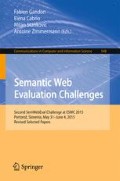Abstract
Most systems for opinion analysis focus on the classification of opinion polarities and rarely consider the task of identifying the different elements and relations forming an opinion frame. In this paper, we present RAID, a tool featuring a processing pipeline for the extraction of opinion frames from text with their opinion expressions, holders, targets and polarities. RAID leverages a lexical, syntactic and semantic analysis of text, using several NLP tools such as dependency parsing, semantic role labelling, named entity recognition and word sense disambiguation. In addition, linguistic resources such as SenticNet and the MPQA Subjectivity Lexicon are used both to locate opinions in the text and to classify their polarities according to a fuzzy model that combines the sentiment values of different opinion words. RAID was evaluated on three different datasets and is released as open source software under the GPLv3 license.
Access this chapter
Tax calculation will be finalised at checkout
Purchases are for personal use only
Notes
- 1.
- 2.
- 3.
- 4.
In literature, terms defining roles in opinions may vary: in particular, the holder can also be expressed as source, and the target as topic.
- 5.
- 6.
- 7.
- 8.
- 9.
- 10.
- 11.
- 12.
- 13.
- 14.
- 15.
- 16.
This normalization does not affect the expression returned by the system and is required as expressions extracted in Sect. 3.2 might not be aligned with parse tree constituents.
- 17.
- 18.
- 19.
The choice of a supervised approach in place of hard-coded rules is motivated also by observing that none of the datasets considered in Sect. 2.2 provides clear guidelines for marking holders and targets, resulting in heterogeneous and sometimes inconsistent annotations.
- 20.
- 21.
References
Almeida, M.S.C., Figueira, H., Mendes, P.: Aligning Opinions : Cross-Lingual Opinion Mining with Dependencies (2012)
Balahur, A., Steinberger, R., Kabadjov, M., Zavarella, V., Van Der Goot, E., Halkia, M., Pouliquen, B., Belyaeva, J.: Sentiment analysis in the news. In: Proceedings of the Seventh International Conference on Language Resources and Evaluation (LREC 2010), pp. 2216–2220 (2010)
Cambria, E., Olsher, D., Rajagopal, D.: Senticnet 3: a common and common-sense knowledge base for cognition-driven sentiment analysis. In: AAAI, pp. 1515–1521 (2014)
Cambria, E., Schuller, B.B., Xia, Y., Havasi, C.: New avenues in opinion mining and sentiment analysis. IEEE Intell. Sys. 28(2), 15–21 (2013)
Choi, Y., Breck, E., Cardie, C.: Joint extraction of entities and relations for opinion recognition. In: Proceedings of the 2006 Conference on Empirical Methods in Natural Language Processing, EMNLP 2006, pp. 431–439. Association for Computational Linguistics, Stroudsburg (2006)
Crammer, K., Dekel, O., Keshet, J., Shalev-Shwartz, S., Singer, Y.: Online Passive Aggressive Algorithms 7, 551–585 (2003)
Dragoni, M., Tettamanzi, A.G.B., Pereira, C.C.: Propagating and aggregating fuzzy polarities for concept-level sentiment analysis. Cogn. Comput. 7(2), 186–197 (2015)
Gangemi, A., Presutti, V., Recupero, D.R.: Frame-based detection of opinion holders and topics: a model and a tool. IEEE Comput. Intell. Mag. 9(1), 20–30 (2014)
Hellendoorn, H., Thomas, C.: Defuzzification in fuzzy controllers. Intell. Fuzzy Sys. 1, 109–123 (1993)
Johansson, R., Moschitti, A.: Relational features in fine-grained opinion analysis. Comput. Linguist. 39(3), 473–509 (2013)
Kim, S-M., Hovy, E.: Extracting opinions, opinion holders, and topics expressed in online news media text. In: Proceedings of the Workshop on Sentiment and Subjectivity in Text, SST 2006, Association for Computational Linguistics, pp. 1–8, Stroudsburg (2006)
Ruppenhofer, J., Somasundaran, S., Wiebe, J.: Finding the sources and targets of subjective expressions. In: The Sixth International Conference on Language Resources and Evaluation (LREC 2008), 2 (2008)
Stoyanov, V., Cardie, C.: Annotating topics of opinions. In: Proceedings of the Sixth International Conference on Language Resources and Evaluation (LREC 2008), European Language Resources Association (ELRA), Marrakech, May 2008. http://www.lrec-conf.org/proceedings/lrec2008/
Toprak, C., Jakob, N., Gurevych, I.: Sentence and expression level annotation of opinions in user-generated discourse. In: Proceedings of the 48th Annual Meeting of the Association for Computational Linguistics, ACL 2010, Association for Computational Linguistics, pp. 575–584, Stroudsburg (2010)
Wiebe, J., Wilson, T., Cardie, C.: Annotating expressions of opinions and emotions in language. Lang. Res. Eval. 39(2–3), 165–210 (2005)
Wiegand, M., Klakow, D.: Convolution kernels for opinion holder extraction. In: Human Language Technologies: The 2010 Annual Conference of the North American Chapter of the Association for Computational Linguistics, HLT 2010, Association for Computational Linguistics, pp. 795–803, Stroudsburg (2010)
Wilson, T., Wiebe, J., Hoffmann, P.: Recognizing contextual polarity in phrase-level sentiment analysis. In: Proceedings of the Conference on Human Language Technology and Empirical Methods in Natural Language Processing, HLT 2005, Association for Computational Linguistics, pp. 347–354, Stroudsburg (2005)
Yu, H., Hatzivassiloglou, V.: Towards answering opinion questions: Separating facts from opinions and identifying the polarity of opinion sentences. In: Proceedings of the 2003 Conference on Empirical Methods in Natural Language Processing, EMNLP 2003, Association for Computational Linguistics, pp. 129–136, Stroudsburg, (2003)
Zadeh, L.A.: Fuzzy sets. Inf. Control 8, 338–353 (1965)
Zadeh, L.A.: The concept of a linguistic variable and its application to approximate reasoning - i. Inf. Sci. 8(3), 199–249 (1975)
Zhang, L., Liu, B.: Aspect and Entity Extraction for Opinion Mining. In: Chu, W.W. (ed.) Data Mining and Knowledge Discovery for Big Data. SBD, vol. 1, pp. 1–40. Springer, Heidelberg (2014)
Author information
Authors and Affiliations
Corresponding author
Editor information
Editors and Affiliations
Rights and permissions
Copyright information
© 2015 Springer International Publishing Switzerland
About this paper
Cite this paper
Palmero Aprosio, A., Corcoglioniti, F., Dragoni, M., Rospocher, M. (2015). Supervised Opinion Frames Detection with RAID. In: Gandon, F., Cabrio, E., Stankovic, M., Zimmermann, A. (eds) Semantic Web Evaluation Challenges. SemWebEval 2015. Communications in Computer and Information Science, vol 548. Springer, Cham. https://doi.org/10.1007/978-3-319-25518-7_22
Download citation
DOI: https://doi.org/10.1007/978-3-319-25518-7_22
Published:
Publisher Name: Springer, Cham
Print ISBN: 978-3-319-25517-0
Online ISBN: 978-3-319-25518-7
eBook Packages: Computer ScienceComputer Science (R0)

